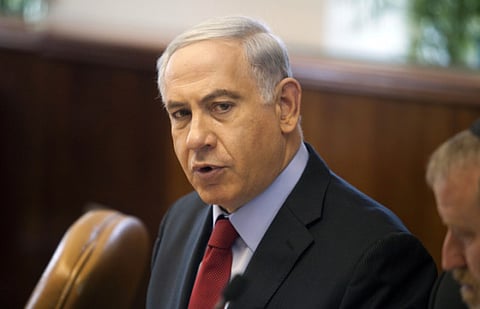Seeing through the Netanyahu game plan
Netanyahu has capitalised on the event to score points against Palestinians

Arabs say that every downhill has an uphill. In other words, the precipice where the current deplorable Arab situation appears on the verge of taking a nose-dive still has the opportunity to survive in the days ahead despite the sickening sectarian conflicts and troublesome disputes that splintered Arab leaderships raging almost everywhere, paralysing this strategic region. The Obama administration, which had refrained from getting immersed in the turmoil — as has been the case in Syria, to cite but one prominent example — is now seemingly considering sending more American troops back to Iraq despite the mess that the Bush administration had created there.
The shortsightedness of western leaders in the last few decades in aligning with various Arab military leaders has proven disastrous. Their alternative should have been in promoting democracy in the region as opposed to partnerships with one-man regimes, a step adopted thereafter by the Arab Spring that overthrew several of these senior Arab officers, who were usually good allies of the western world. Again, disappointingly, the emerging opposition movements — which could not be confronted — were predominantly led by religious groups that ultimately precipitated sectarianism in the region. Interestingly, a just released survey in several Muslim countries, conducted by the Washington-based Pew Research Centre, saw “concern about Islamic extremism (was) high among countries with substantial Muslim populations”.
In turn, US Secretary of State John Kerry, who had disappointingly failed in settling the Palestinian-Israeli conflict, had a memorable line when addressing Iranian leaders who have a July 20 deadline to negotiate a comprehensive agreement on Iran’s nuclear programme. In an article in the Washington Post on Tuesday, which was republished in Gulf News yesterday, he said: “In this troubled world, the chance does not often arise to reach an agreement peacefully that will meet the essential and public-expressed needs of all sides, make the world safer, ease regional tensions and enable greater prosperity. We have such an opportunity, and a historic breakthrough is possible. It’s a matter of political will and proving intentions, not of capacity. It’s a matter of choices. Let us all choose wisely.”
It is disappointing that Kerry did not, likewise, focus in his column on the on-going Israeli retaliation against Palestinians, particularly those in the Gaza Strip governed by Hamas, the Palestinian Islamist group, in the wake of the death of the three young Israeli colonists, whose bodies were found in Israeli-occupied West Bank. For the record, Hamas has repeatedly denied any role in the kidnapping of the colonists who disappeared near the Palestinian town of Hebron.
What Israeli Prime Minister Benjamin Netanyahu is up to was revealed in his pledge that Hamas would pay for the slayings, Reuters reported. Israel “must strike hard at Hamas people and infrastructure in the West Bank”, he declared and was ready to weigh further attacks to prevent rocket-fire from Gaza. Since the abduction of the Israeli students on June 12, Netanyahu had capitalised on the event to score several points against the Palestinians. His main objective has been to force Palestinian President Mahmoud Abbas to withdraw from his reconciliation agreement with Hamas, which was aimed at reunifying Palestinian ranks. Abbas had condemned the abduction of the young Israelis and pledged the cooperation of his security forces. That gesture drew criticism from Hamas and undercut his popularity among Palestinians angered by what they saw as his collusion with Israel.
In another divisive step, the Israeli prime minister has also voiced support for Kurdish independence, a region that is a part of Iraq, where other extremists have usurped significant areas.
Meanwhile, B’Tselem, an Israeli human rights group, had called on Netanyahu to refrain from acts of vengeance for the death of the three Israeli teenagers, saying “the deliberate harming of an entire civilian population as punishment for the actions of individuals is both illegal and immoral”. Hundreds of Palestinians from the West Bank have been arrested as a result of the Israeli search and more than 100 Palestinians have been injured.
In a column last week published in Haaretz, the liberal Israeli daily, Gideon Levy wrote: “Now, Israel is discovering that it’s no longer the centre of attention, as it always was before, and the fate of its kidnapping victims no longer stops the world in its tracks, not even in the United States,” adding that “the world is sick of Israel and its insanities”.
George S. Hishmeh is a Washington-based columnist. He can be contacted at ghishmeh@gulfnews.com


